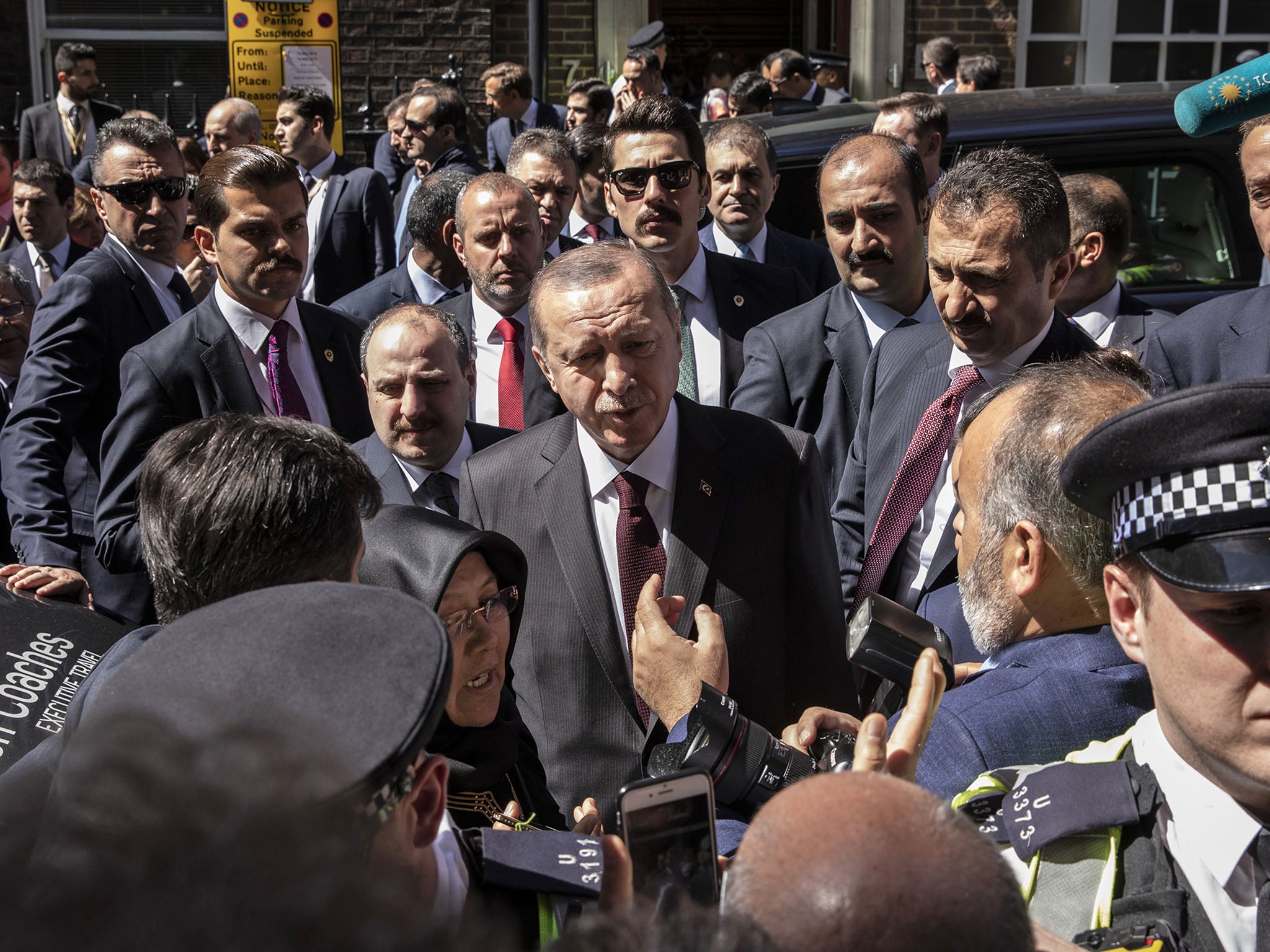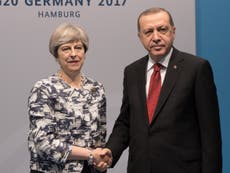Post-Brexit, the UK will need Turkey for trade – and Erdogan is using that to his advantage
Trade figures could be deemed to be more important rather than ones more inconvenient, such as 140,000 people detained and 152,000 dismissed from their posts. Among those jailed are teachers, doctors, lawyers, judges, military, police and 254 journalists


There is a very good reason why Recep Tayyip Erdogan chose Britain as the destination for his high-profile foreign visit before the election he has called back home. There is little chance of Theresa May’s government embarrassing him by saying or doing anything about the sorry state of human rights in Turkey and the tens of thousands imprisoned.
There have been calls in London by opposition groups, lawyers and campaigners for the Turkish president to be brought to account, as well as protests outside a think tank, Chatham House, where he spoke on Monday morning. But there have also been gatherings of flag-waving supporters organised by the ruling Justice and Development Party (AKP), the country’s embassy and groups from Britain’s large Turkish expatriate community.
Erdogan, who will be meeting the prime minister and the Queen, has declared that Britain is “an ally and a strategic partner, but also a real friend ... The cooperation we have is well beyond any mechanism that we have established with other partners.” Turkey’s president pointed out that the UK was among the first to condemn the attempted coup in July 2016 blamed on the exiled cleric Fethullah Gulen. A British minister visited Turkey soon afterwards: it was the kind of “solidarity that will not be forgotten”, he said.
But then, tellingly, he added: “We are very ready to cooperate with the UK post-Brexit in every field ... I see the strategic partnership between Turkey and the UK as a necessity, rather than a simple choice, for the interests of the two countries.” It is a theme he has visited many times, saying in one recent speech: “The UK will need trade after Brexit, and rest assured Turkey is willing to help.”
The British government is certainly keen to focus on trade, rather than controversial political issues. Theresa May’s visit to Turkey in January 2017 – at the time when the Erdogan government was facing severe criticism over civil rights abuse following the failed putsch – was really all about trade. After meeting Erdogan, she said: “You mentioned, Mr President, the opportunities for enhancing the trade between our two countries and we have discussed that. I believe doing so will be to the benefit of both our countries and for the prosperity of both our nations.”
One of the benefits for Britain is a $135m (£99m) deal under which BAE Systems develops fighter jets for the Turkish Air Force. There is hope that Rolls-Royce will win the contract to build the engines and a number of other companies will also benefit. The aspiration is that this will lead to sustained cooperation and contracts with Turkey’s military.
Trade between Turkey and UK currently stand at $16bn; Erdogan has declared that he wants to raise this to $20bn in the next few years. The UK doubled its export finance programme for Turkey last year to almost $5bn, and there are plans to increase cooperation on energy, healthcare, manufacturing and defence.
With Britain facing an uncertain economic future after leaving the European Union and the spectre of a “hard Brexit” looming, these figures could be deemed to be more important rather than ones more inconvenient such as 140,000 people detained and 152,000 dismissed from their posts. Among those jailed are teachers, doctors, lawyers, judges, military and police and 254 journalists – the largest number of members of the media jailed anywhere in the world.
There is an element of irony in this stance of a British government with its contingent of powerful Brexiteers. During the referendum, the Leave campaigners ran xenophobic, and false, ads claiming that 100 million Turks were about to join the European Union. Michael Gove accused Brussels of “appeasing Ankara” with the charge that “democratic development has been put into reverse under President Erdogan”, while Boris Johnson won a “free speech” competition organised in protest at Turkish censorship of a poem he wrote that described Erdogan as a “w***erer from Ankara” with a tendresse for goats.
Erdogan, nevertheless, has chosen a good destination for a pre-poll international trip. Turkey’s chances of getting into the European Union remain slim after years of efforts, although there was a pronouncement from Johnson, bizarre even by his standards, during a visit to Ankara as foreign secretary, that the UK would fully back Turkey’s application to join even after it left the EU itself.
So in “the cooing-up of two EU castaways” as Faruk Logoglu, the former Turkish ambassador to the US, put it, it makes sense to London and Ankara to draw together and thus there are meetings between British business leaders and the Turkish delegation alongside that of the Turkish president and the British prime minister.
It is possible, however, that in the unstable politics of Britain, May might not survive to see the supposed partnership between Britain and Turkey come to fruition. But what of Erdogan? The Turkish president has brought forward the election from November to June in anticipation of decisive victory. The opposition has been damaged in the crackdown and he and his supporters are banking on a surge in nationalist votes following what are seen as successful military operations against the Kurds in Syria.
The election is one of the most crucial in Turkish history with the changed constitution, passed in last year’s referendum, coming into effect afterwards. Under the new system the president will appoint all government ministers and the cabinet will no longer be answerable to parliament.
The expectation has been that Erdogan, who carried out the changes to the constitution, would be the beneficiary as the new president. But the opposition parties have been unusually cooperative towards each other and the tactics they have been pursuing may mean that voting goes, at least, to the next round.
Erdogan’s opponents have profited from an own goal from the president. Confident in his victory, he declared expansively in parliament: “If one day our nation says ‘enough’, then we will step aside”. #Tamam, “Enough” in Turkish, has now rocketed with tweets telling Erdogan that Turkey has had enough of him and he must go.
It is a social media phenomenon, but social media, as we know, does have significant impact on modern polls and as the momentous election approaches, #Tamam has become a uniting slogan for an opposition fervently striving to stop Erdogan becoming anointed as the all-powerful, latter-day Ottoman sultan of Turkey.


Join our commenting forum
Join thought-provoking conversations, follow other Independent readers and see their replies